Sustainable Microfinance - Balanced Scorecard's added value for ...
Sustainable Microfinance - Balanced Scorecard's added value for ...
Sustainable Microfinance - Balanced Scorecard's added value for ...
You also want an ePaper? Increase the reach of your titles
YUMPU automatically turns print PDFs into web optimized ePapers that Google loves.
that fail to effectively plan <strong>for</strong> the future of the business (Davig et al., 2004; Orser et<br />
al., 2000; Shrader et al., 1989). One of the reasons given <strong>for</strong> this failure to plan is the<br />
limited time available to entrepreneurs, who are often engaged actively in day-to-day<br />
operations. In addition, some argue that <strong>for</strong>mal planning would actually negatively<br />
affect the flexibility of the firm, seen as a key competitive advantage <strong>for</strong> many SBs,<br />
they can proactively shift operations and focus to meet changing customer<br />
requirements (Davig et al., 2004; Knight and Knight, 1993).<br />
Author(s) Main Findings<br />
Knight and<br />
Knight (1993)<br />
Davig, Elbert<br />
and Brown<br />
(2004)<br />
Van Auken and<br />
Sexton (1985)<br />
Fitzgerald and<br />
Moon (1996)<br />
Orser, Hogarth-<br />
Scott and<br />
Riding (2000)<br />
• SB planning is unstructured, irregular, sporadic and reactive<br />
• SBs only see need <strong>for</strong> <strong>for</strong>mal planning when seeking financing<br />
• Formal planning may impair flexibility, which is critical to SBs success<br />
• Insufficient time <strong>for</strong> planning exists in SBs<br />
• Formal planning may impair flexibility<br />
• Size differences impact these patterns<br />
• Little or no strategic planning in SBs<br />
• Operational planning is more prevalent<br />
• Objectives of planning, when done, are often vague, pragmatic, and<br />
extremely short-range<br />
• Per<strong>for</strong>mance of SBs who engage in some <strong>for</strong>m of planning exceeds<br />
that of the SB firms that do not undertake planning<br />
• In the US, over 64% of SBs do no <strong>for</strong>mal planning<br />
• Growth occurs only when al threshold of administrative and<br />
managerial acumen is attained by the management team<br />
• The presence of a business plan was highly correlated with<br />
per<strong>for</strong>mance<br />
Table 3.3: Planning in the Small Business Sector (Watts et al., 2009b)<br />
Most !<br />
owner-managers are generalists with a very broad level of practical experience<br />
yet they often lack the expertise to accomplish the planning task (Meredith, 1989).<br />
Many owner- managers become reactive rather than proactive in their decision-<br />
making. This fact can be seen from two perspectives; MSE operate in ‘fire-fighting’<br />
mode because of the failure to plan effectively (Shrader et al., 1989); strategic<br />
planning does not occur in MSE (or only occurs to a small degree) because the firm’s<br />
viability is dependent on flexibility and a keen understanding of operational<br />
competencies (Davig et al., 2004; Knight and Knight, 1993).<br />
Elmar Hoogendoorn 40<br />
<strong>Sustainable</strong> <strong>Microfinance</strong>



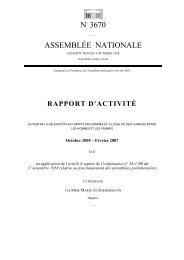


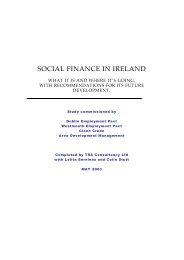

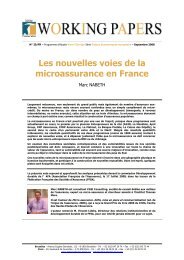





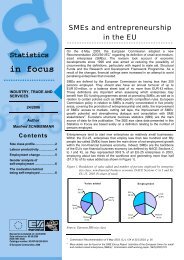
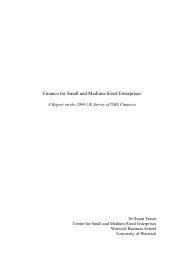
![Joint Report on Social Protection and Social Inclusion [2005]](https://img.yumpu.com/19580638/1/190x132/joint-report-on-social-protection-and-social-inclusion-2005.jpg?quality=85)
